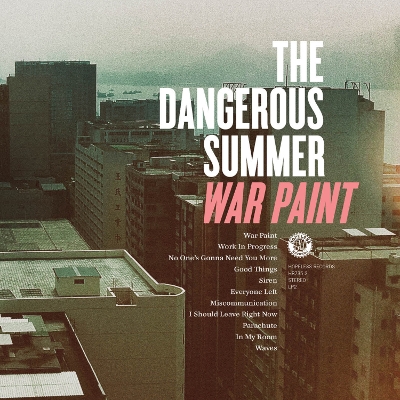Retrospective Review: The Dangerous Summer – ‘War Paint’
Posted: by admin

This “Retrospective Series” will take a look back at a handful of my favorite albums released over the course of the last fifteen years. My goal is to give you, the reader, an introspective look at my initial reactions and opinions to each album, and how my thoughts may have evolved from release to present day. Finally, I hope to explain why each record continues to maintain my attention and affection (and demands yours as well) even years after release and hundreds of streams later.
This first retrospective will examine The Dangerous Summer’s album ‘War Paint’, which was released on July 19, 2011.
Unfortunately, expectations don’t always meet reality. In music, the most frequent disappointment is the “sophomore slump.” The phenomena whereby a young band releases an incredible debut, but falls short of matching it with a subsequent release. Regardless of the group’s own expectations or pressure by the label and fans, such anxieties can amass to create a level of discomfort that then disables the band to write in a relaxed state. Consequently, the work that follows is often rushed, or simply not objectively as good as what came prior.
If any band was dealing with the proverbial “monkey on the back” of avoiding a sophomore slump, it was The Dangerous Summer. Their debut full-length, Reach for the Sun, drew vast critical acclaim and gained them a wide-reaching audience overnight. In the following few years, it was obvious the band wasn’t quite equipped with the support it needed to deal with the enormous pressure it was facing while writing their follow-up.
Given the lack of support and seemingly insurmountable pressure, it is astounding that what came next was a genre-defining album best described as alternative rock mastery. Front to back, War Paint has elements of contemporary scene classics. The grunge and anger of The Devil and God, the melodically urgent but not rushed song structures of Stay What You Are, and the crushing and expansive choruses of The Room’s Too Cold. These elements, accentuated by the band’s chiming, serene guitar-work, and journal-entry like lyricism already perfected on Reach for the Sun shifted their sound from one of blissful fragility to an atmospheric, arena-rock style that was suggestively slower, darker, and more dense.
The album’s heaviest hitting songs, “Siren” and “Everyone Left” address perseverance, and the difference between independence and loneliness. Both begin with a singular guitar, thunderous drums, and a hesitant vocal approach leading the listener to believe each is going to be a solemn affair. On “Siren”, vocalist AJ Perdomo opens with “Well I lost a title, I’m gonna float away” and on “Everyone Left”, he sings “They watched their love die, but picked it up later when they found that rope.” But Perdomo’s greatest asset is turning his sadness into energy used to fuel a more (seemingly) optimistic outlook by each song’s finish, similarly mirrored by the band with two blazing, cathartic finishes.
If War Paint has a defining feature, perhaps it’s the way The Dangerous Summer didn’t sacrifice its gigantic hooks or menacing pace in exchange for an atmospheric, dark tone. Instead, War Paint seamlessly incorporates moody elements into their verses and choruses. The album never becomes too uplifting or unsettling in its demeanor, but still manages to portray the few emotions it wants its listener to recognize. War Paint seamlessly transitions over a range speeds and volumes, while actively portraying a few singular emotions it wants the listener to recognize. On War Paint, the Dangerous Summer made this difficult feat look easy.
– Colin










